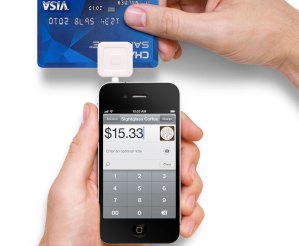
San Francisco startup Square which makes tiny card readers for smartphones that enable virtually anyone to process credit card transactions, has received an undisclosed strategic investment from Visa. Visa is the top credit card company on the planet: Visa’s investment in Square amounts to an endorsement of Square’s technology and ideas, which were recently very publicly challenged by Verifone for suffering from a fundamental security flaw.
Launched by Twitter co-founder Jack Dorsey in 2009, last year Square began offering free credit card readers to merchants and individuals on very simple 2.75 percent terms, with no merchant account or other complicated banking setup required to process credit card transactions. The Square reader pops into an Android or iOS smartphone via an audio port, and Square’s application software processes the rest of the transaction. Square has signed up hundreds of thousands of individuals and businesses, and the technology is widely seen as disruptive to the broader credit card industry, which thrives on processing fees to merchants and selling expensive point-of-sale card readers for processing transactions.
Few were surprised when credit card processor VeriFone came out against Square, but the public and aggressive nature of the attack were almost unprecedented, claiming that any programmer could make an app that skimmed consumer’s credit card information. At the heart of Verifone’s complaint was that the Square reader sends creditor card data to the smartphone in an unencrypted format, making it ripe for plucking by other applications.
Square’s Jack Dorsey responded that all the information anyone needs to “skim” a card is printed on the card itself, and any technology—including paper and pen—can be used to obtain that information, and noted that partner bank JPMorgan Chase didn’t have any problem with Square’s technology.
Nonetheless, now that Visa has made an unspecified investment in Square, the company plans to add encryption to its card readers. Square COO characterizes adding encryption to the card reader not as a capitulation to Verifone, but as an adoption of best practices.
“Square complies with all current industry standards, and we are committed to meeting or exceeding industry guidelines as they evolve — all while keeping our card reader free,” Rabois wrote.
Jack Dorsey recently returned to Twitter as executive chairman; he continues to serve as CEO of Square.


